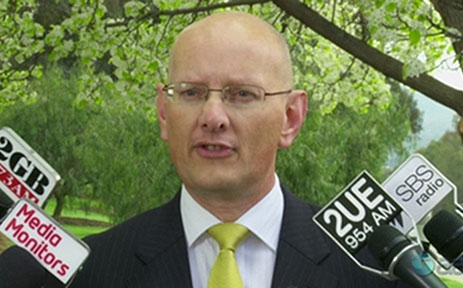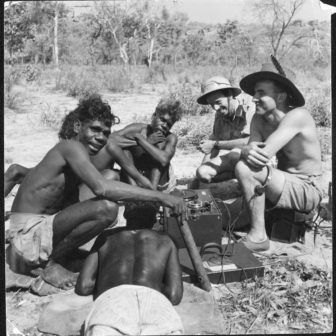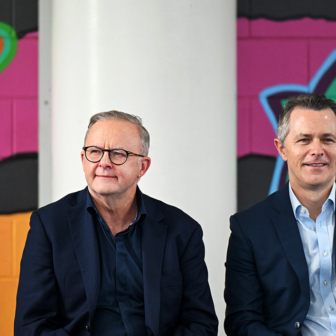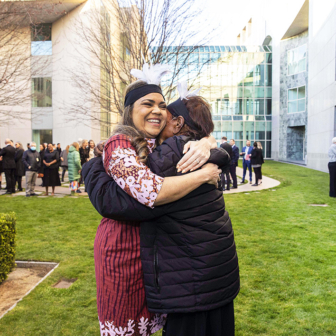THE first school in Australia to teach in an Indigenous language was set up by German missionaries in Adelaide in 1838 with the support of the governor, George Gawler. More schools teaching in the local Kaurna language opened in and around Adelaide during the 1840s, but this innovative education program was short-lived. Gawler’s successor, George Grey, who was much less sympathetic to the missionaries’ approach, closed some of the schools and directed the others to teach in English instead. Since those early experiments, First Australians’ right to educate their children in their own languages has depended on the political mood and the goodwill of those in power, rather than on recognition in law, as is the case in New Zealand.
A new federal parliamentary report, Our Land Our Languages, proposes a major shift in the way the nation understands and recognises Indigenous languages. “I say to all Australians, take pride in the Indigenous languages of our nation,” said Labor MP Shayne Neumann, who chaired the Aboriginal and Torres Strait Islander Affairs committee’s inquiry, when he released its report last week. “Indigenous languages bring with them rich cultural heritage, knowledge and a spiritual connection to the land.” The committee’s recommendations signal an encouraging shift in attitudes, but history and contemporary politics suggest that transforming them into statutory recognition and policy action will be a challenge.
Nowhere have the swings in the political mood about Indigenous languages been more evident than in the Northern Territory. In the late 1990s, the territory government attempted to axe its bilingual education programs but Indigenous peoples campaigned successfully – using the slogan “Don’t cut off our tongues” – to preserve them. It was the height of the Reconciliation era and public sympathy was reflected in the biggest petition ever presented to the Legislative Assembly. By 2007–08, as the Northern Territory Intervention got under way, the mood had changed. Conservative figures including Mal Brough and Noel Pearson had gained the ear of policy-makers and the news media. Despite a large body of evidence that bilingual programs work better for children who start school speaking only their mother tongue, these influential figures advocated that all Indigenous students should learn only in English.
The territory government responded in 2008 by requiring all schools to teach in English for the first four hours of the five-hour school day. The protests of Indigenous territorians were hardly audible in the national debate that followed. Rosa McKenna, who became principal at the Yolŋu school at Yirrkala in North-East Arnhem Land in 2009, was one of a number of NT education department staff who supported the right to a bilingual education after the policy announcement only to find themselves transferred out of schools or without a renewal of their contract. Four Corners visited Yirrkala to report on the impact the “first four hours” policy was having at Yirrkala in early 2009; by the end of that year, McKenna (who did not participate in the program) was out of a job, much to the school council and community’s dismay. This week, following the release of the federal committee’s report, McKenna says wryly, “Isn’t it interesting that with the flow-on from one positive report the whole discourse changes.”
Both sides of politics now say they support more action to acknowledge and protect Indigenous languages and use them in the education, health and justice systems. Our Land Our Languages recognises that language is inseparable from culture, kinship, land and family and is the foundation on which the capacity to learn, interact and to shape identity is built. Among its thirty recommendations, the report proposes that Indigenous languages should be recognised in the Australian constitution, in Closing the Gap policies and in the wider community. MPs should take the lead in promoting these and other initiatives, says the committee, including the introduction of locality and landmark signage in local Indigenous languages.
According to Greg Dickson, a PhD fellow in linguistics at the Australian National University who monitored the inquiry’s public hearings, “there were plenty of tears because language is very close to people’s hearts, minds and identities.” He says it was heartening to see that the politicians from the government and the opposition who conducted the inquiry understood what was at stake, were able to articulate the issues well, and produced a report with strong findings and concrete, achievable recommendations.
Our Land Our Languages compares national recognition of Indigenous languages to the momentous Mabo decision, which was instrumental in transforming Australia’s legal and cultural understanding of Indigenous rights by debunking the legal myth of terra nullius. According to the report, “the notion that Australia is a monolingual nation and that only Standard Australian English can benefit a person is a fiction.”
Until now, it has been a very popular fiction. As Dickson observes, public discussion of Indigenous languages in Australia has been rare and superficial – and generally, when they are discussed, their social and economic value is questioned. Common arguments against supporting and preserving Indigenous languages point, he says, to the central economic role of English, the symbolic importance of English as the national language and its role in nation-building, and the cost and difficulty of resourcing small languages.
ALTHOUGH the report doesn’t identify a role for the news media, a recent Australian Research Council–funded project – on which I was a researcher – suggests that the media have a key role to play in fostering a more positive national conversation about Indigenous language policies. The Australian News Media and Indigenous Policymaking 1988–2008 project identified a direct link between the “monolingual mindset” in news media, the discussion of bilingual education policy in the Northern Territory, and government attempts to axe the programs over the past two decades.
The project found that the territory government’s decision to dismantle its bilingual education programs in 2008 was a kneejerk response to the national news media’s spotlight on remote Indigenous students’ poor results in the first NAPLAN tests. Study participants said journalists who reported on the results did not question whether NAPLAN is a reliable measure of the literacy achievements of children who were learning to read and write in another language first. They said the territory government should have pointed to the inequities in the national testing regime for its remote Indigenous students rather than dismantling the bilingual programs. Now, the new federal report recommends that assessments of Indigenous children entering early childhood education should be in their mother tongues, and that alternative NAPLAN methods and reporting should be available for students whose first language is not English.
Study participants said Australia’s “monolingual mindset” had been the source of opposition to the bilingual programs since their inception in the early 1970s. According to linguist Aiden Wilson, the English-speaking world, with some exceptions, has a “monolingual mindset” – a belief that we should concentrate on using English and not waste resources on other languages. It was identified by study participants as operating at every level of society, from prime ministers to journalists and news audiences. Academic Tess Lea, one of the authors of the 1999 Learning Lessons report on Indigenous education in the Northern Territory, told us that when she attended the federal government’s 2020 Summit in 2008, “I had none other than [then prime minister] Kevin Rudd sitting opposite me saying what would you suggest? I said well, here's what I'd suggest... We have Australian languages, they need to be invested in, we could be learning from them. We could be in fact, bilingual in Australian languages first, and he said, ‘Cost too much money,’ and he moved off the table.”
Trish Crossin, a Labor senator from the Northern Territory and long-time advocate of the bilingual programs, said it was a “fixation” of the mainstream that “we’ve got to teach these kids to operate in a non-Indigenous world.” The way we do that “is we’ve got to give them English as soon and as quickly and as early as possible. They’re just fixated on kids will never be able to cope in our society unless they’ve got English.”
Darwin-based Fairfax journalist Lindsay Murdoch offered the insight that the nation’s view of English as the superior language made the “first four hours” policy politically palatable: “It's an easy thing to sell … This is Australia and they will learn English for [four] hours of the day...” He believes that governments get political points for being tough on the issue, but that “the reality’s different. Up here, in remote communities… they’re adamant that you've got to teach them in [their own] language first and then the other [language] comes, otherwise it doesn’t work.”
Study participants said Australia’s first languages are not only overlooked in the media but are also not often heard, and this reinforces their “foreignness.” Former journalist Chips Mackinolty said it was rare for reporters to incorporate any Indigenous languages into their stories. “I reckon I'm one of the very few that have used it,” he said. According to journalist Bob Gosford, this monolingual mindset was reinforced by mainstream Australia’s geographic remoteness from communities where Indigenous languages are dominant: “Most people in Australia would never have heard an Aboriginal person speaking their own languages, so there's no sort of connect.”
AUSTRALIA’s treatment of Indigenous languages contrasts starkly with New Zealand’s approach. Māori was declared an official language in 1987 and the same legislation created a Māori Language Commission. Māori is taught in schools, is used extensively in public documents and the news media and circulates in wider society every day. The chief executive of the commission, Glenis Philip-Barbara, told me last week that the hard-fought struggle to gain official status for Māori language in 1987 was worthwhile because “statutory recognition provides a policy platform, national legitimacy and is important to anything you’re trying to achieve.”
Philip-Barbara commended the Australian parliamentary inquiry for its recognition of the value of Australia’s Indigenous languages and the benefits of bilingualism in Indigenous education, and for paying its respects to the many people doing excellent language work in communities with poor policy support. She describes the monolingual mindset of postcolonial nations such as Australia and New Zealand as “the national common sense.” The challenge for Indigenous people was to generate a national conversation about a different national common sense.
“When I talk to Australians they want to talk about our success with Māori language,” she says. “When I want to talk about recognition and use of Australia’s Indigenous languages with them, so many of them say it’s impossible, there are too many languages to have a cohesive national strategy. It’s a cop-out. If we can manage to acknowledge territorial differences, there’s no reason why we can’t manage linguistic diversity.”
Changing the national attitude to Indigenous cultures and languages involves realising their unique value in a globalised world. “As the world shrinks people are searching for the authentic cultural ‘other,’” Philip-Barbara said. “It’s become the measure of what’s cool. Indigenous people are powerfully poised in this world as long as we are willing to be generous in sharing our languages and our cultures with others.” This involves Indigenous people clearly establishing within their communities and families which aspects of their lives, languages and cultures are appropriate to share, and what they are willing to share. Such initiatives depend on sharing “with an open heart, as people know when we are not.”
Philip-Barbara has spoken to many white New Zealanders and Australians over the past few years about their desire for a deeper and more meaningful connection to the places they call home. “My advice is always the same: develop respectful relationships with the people of the land, and with the language of the land. In my experience this is how meaningful belonging takes place.”
The federal government’s announcement this week that it will delay a national referendum to acknowledge First Australians in the constitution for at least three years means that formal, symbolic recognition of their languages remains beyond the horizon. The government fears that a failure to build community support before the deadline of the next election would see the proposal defeated.
The lead researcher on the Australian News Media and Indigenous Policymaking 1988–2008 project, the University of Canberra’s Kerry McCallum, says that using public opinion as the excuse for lack of action on Indigenous rights has been a political cop-out since 1983, when Bob Hawke reneged on his government’s promise to enact land rights legislation. She says governments will only bring about positive change in Indigenous affairs by leading public opinion, not following it.
“Governments are the most powerful players in society,” she says. “If they want positive change in Indigenous affairs they have to drive it by deliberately framing the debate in positive ways and working to bring the community along with them.”
Our Land Our Languages’s very constructive recommendations for Indigenous language policy have met with overwhelmingly positive news coverage and public discussion in social media. Can the rhetoric be translated into political action? •




